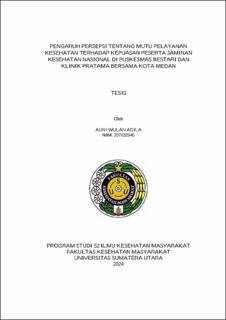| dc.description.abstract | Health service quality is a crucial factor in determining patient satisfaction, especially for participants of the National Health Insurance (JKN) who receive services at health facilities such as Puskesmas Bestari and Klinik Pratama Bersama in Medan City. This study aimed to analyze the influence of perceptions of health service quality on the satisfaction of JKN participants at these two health facilities. The method used was a quantitative approach with a cross-sectional design. The study population was JKN participants at both health facilities. The sample was taken using the incidental sampling technique, with a total sample of 384 patients calculated using the Lemeshow equation formula. Data were collected through closed questionnaires, unstructured interviews, and documentation studies. The data were then analyzed through descriptive statistics and inferential statistics via multiple linear regression analysis and the coefficient of determination. The results showed that partially, the seven dimensions of perceived service quality (time, timeliness, completeness, courtesy, consistency, accessibility and convenience, and responsiveness) positively and significantly influenced the satisfaction of JKN participants at Puskesmas Bestari and Klinik Pratama Bersama. Simultaneously, the seven dimensions of service quality significantly influenced patient satisfaction at Puskesmas Bestari and Klinik Pratama Bersama. Additionally, it was found that 55.8% of the variation in patient satisfaction at Klinik Pratama Bersama could be explained by the eight dimensions of service quality, while the remaining 44.2% was influenced by other factors outside the research model. Meanwhile, for Puskesmas Bestari, it was found that 52.2% of the variation in patient satisfaction could be explained by the eight dimensions of service quality, and the remaining 47.8% was influenced by other factors outside the research model. These research findings provide useful information for health service providers in their efforts to improve service quality and patient satisfaction, particularly for JKN participants in Medan City. | en_US |


